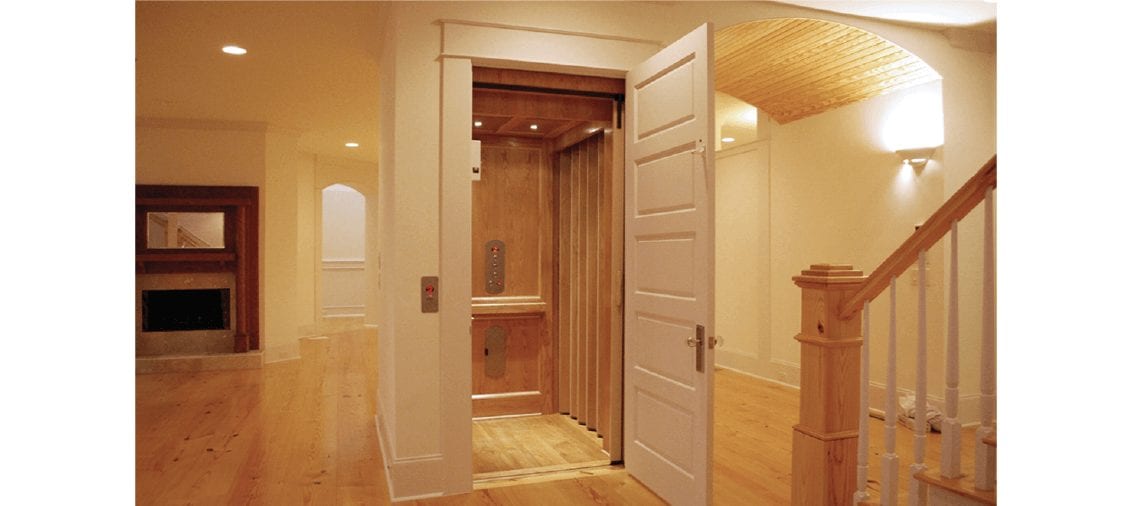If you wish to stay in your home well into the future, the addition of an elevator may increase your peace of mind and provide a practical, long-term solution. Having a residential elevator installed can extend the useful life of your family home and create a means for safely accessing all floors of your living space. An in-home elevator may prove useful for transporting groceries, laundry, and other bulky loads to upper and lower levels in the home. Having a residential elevator is an investment toward comfortable, safe, independent living and has proven to increase the value and marketability of your home should you choose to relocate.
Shopping for an In-Home Elevator
Shopping for a home elevator doesn’t need to be an overwhelming or intimidating task. Preliminary planning can help you identify your needs and desires and focus your research.
When researching residential elevators, there are various factors to consider:
Your needs
Why do you need a residential elevator, and how will you use it? To answer this question, you need to consider how many passengers are likely to use the elevator at once and whether any passengers have mobility issues. Will you be using the elevator to transport heavy items from one level to another? If so, you should choose residential elevators with high weight capacities.
When it comes to stairs vs. elevators, residential elevators are a safer way to move between levels for people with mobility issues and one of the only ways to do so for people with wheelchairs or other accommodation devices. Consider the size, weight, and type of accommodation devices the elevator will need to hold.
Your future needs
What you require from an elevator may change over time, so give some thought to your future needs. If you choose to age-in-place, for instance, will your mobility needs change as you age? You can add products for aging in place to residential elevators, such as flip-down seats, handrails, and remote control fobs. By matching residential elevators to your future needs, you can pay today’s prices for the elevator you’ll need tomorrow.
Choosing a location for your elevator
Where do you want your elevator located? Do you want it hidden discreetly in a closet, or would you rather make it the room’s focal point? You’ll need to consult with your elevator installation service to pick the best spot for your elevator. Closets, corners, and dead space next to stairwells are all possibilities.
Space required for installation
One of the most important considerations when installing a home elevator is how much space the elevator will take up in your home. In addition to the elevator hoistway, a pit may need to be installed at the bottom of the elevator shaft. Many types of elevators require a machine room to house a motor system and electric components, which will also add to the elevator’s overall footprint.
If you’re pressed for space or want a smaller elevator, machine room-less elevator models are available. You can also install an outdoor residential elevator, which allows you to enter and exit the building from multiple floors. As the elevator hoistway is installed along an outer wall, you keep the elevator’s impact on your floor plan to a minimum.
Style and customization of features
Luxury residential elevators have never been more affordable and can be customized to match your home decor. All Symmetry Elevator models allow you to mix and match flooring, elevator doors, car panels, lighting, and control panels to create a style that’s uniquely yours.
Budgetary guidelines and cost considerations
Like many products for aging in place or improving mobility, residential elevators are an investment. The cost of an elevator must be compared to the risk of continuing to use stairs vs. elevators and whether you could age in place in your home without easy access to all levels of your home. Comparable in many cases to the price of a mid-range car, a residential elevator provides decades of use and freedom in return for your initial outlay.
Origin of manufacturing
Check if the elevator you want is manufactured in the USA or elsewhere. Elevators made in the USA must adhere to ADA regulations. You’ll find it easier to find experienced installers for US-made residential elevators and have less trouble securing replacement parts if the need arises.
Reputation of the elevator manufacturer and contractor
Research both the manufacturer of your potential residential elevator and the installation contractor. Look for signs both parties have a well-established reputation for excellence and service.
Safety features
Strict regulations are in place to ensure passenger safety for residential elevators. Battery backups are available to safely bring passengers to the level of their choice in a power outage. All elevators must have a working phone line connected in case of an emergency.
Future maintenance
To ensure years of safe, reliable use, residential elevators must receive regular maintenance and inspections. Check that your elevator installation company offers such services.
Warranty
Finally, take a close look at the elevator warranty to fully understand what parts are covered against defects in materials or workmanship. Symmetry Elevators offers a three-year limited warranty on all our elevator models.
Contact a Qualified Elevator Contractor
Speaking to a local, qualified elevator contractor is the best method for creating a home elevator that will meet your specific needs. They will be able to evaluate the prospective installation space and offer viable options to help you safely stay in your home.

